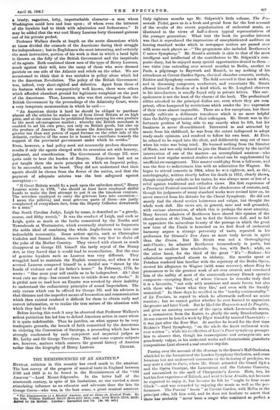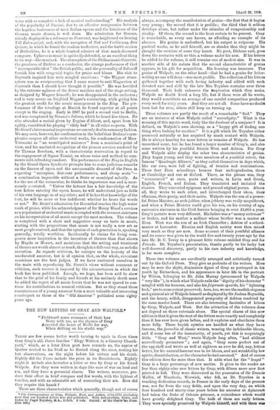THE REMINISCENCES OF AN AMATEUR.* Musican criticism in this country
has owed much to the amateur. The best survey of the progress of musical taste in England between 1780 and 1830 is to be found in the Reminiscences of the "Old Amateur"—Lord Mount-Edgcumbo. In the latter half of the nineteenth century, in spite of his limitations, no one exerted a more • stimulating influence as an educator and advocate than the late Sir George Grove—who was, in the best sense, a great musical amateur.
• The Reminiscence. of a Musical Ainnteur, and an Essay on Musical Taste. By the lion. William Maitland Strad (Born July 20th, 1686; Died March 22nd, 1912). Inked by lila liotJaer. Leaden: Macmillan and Co. ii.. Gd. wt.] Only eighteen months ago Mr. Sidgwick's little volume, The Pro- menade Ticket, gave us in a fresh and genial form far the best account
of the results of the recent popularization of orchestral music, as illustrated in the views of half-a-dozen typical representatives of the younger generation. What lent the book its peculiar interest was that it reproduced the impressions of unsophisticated auditors on hearing standard works which in newspaper notices are passed over with some such phrase as—" The programme also included Beethoven'.
C minor Symphony." Mr. Strafe attitude is akin to that of the most intelligent and intellectual of the contributors to Mr. Sidgwick's com- posite diary, but he enjoyed many special opportunities denied to them — two visits (one extending over several months) to Berlin, another to Paris, a pilgrimage to Bayreuth and Munich, to say nothing of his attendance at Covent Garden Opera, classical chamber concerts, recitals, Richter and Symphony concerts. The field covered is thus much wider, and in discussing composers, conductors, and executents Mr. Strutt allowed himself a freedom of a kind which, as Mr. Langford observes in his introduction, is usually found only in private letters. This out-
spokenness is not the least of the charms of the book. The professional critics attached to the principal dailies are, even where they are coin potent, often hampered by restrictions which render the frse expression of their views almost impossible. There arc a few exceptions, but those usually cultivate a deliberate truculence which is no more helpful
than the flabby opportunism of their colleagues. Mr. Strutt was in the
fortunate position of being able to say exactly what he felt, but his frankness is never ill-conditioned. Interested in and attracted by music from his childhood, he was from the outset indisposed to adopt
ready-made opinions, and resolved to follow his own bent. At Eton he refused to be roped into the choir, and deliberately sang out of tuna when his voice was being tried. He learned nothing from the Director of Music, and was only induced to join the Musical Society by the tactful intervention of one of the masters—an accomplished amateur—who showed how regular musical studies at school can be supplemented by unofficial encouragement. This master could play from a full score, and was the first to indoctrinate him with an admiration for Wagner. He began to attend concerts in 1904, when he wr.i3 eighteen, and, as tilt', autobiography, written shortly before his death in 1912, clearly shows, though singularly catholic in his tastes, he was always more or less of a rebel against traditional and orthodox views. His first experience of a Provincial Festival convinced him of the obsolescence of oratorio, and, though his judgments of many standard works were revised later on, he never swerved from his distaste for the Choral Symphony. He did not merely find the choral section boisterous and vulgar, but thought the whole work dull. His views are, in general, sane and well grounded, with curious aberrations, of which this is perhaps the most amazing.
Many fervent admirers of Beethoven have shared this opinion of the choral section of the Finale, but to find the Scherzo dull, and to fail to appreciate the miraculous beauty of the passage in which the great
new tune of the Finale is launched on its first flood of orchestral harmony argues a strange perversity of taste, repeated in his preference for Strauss's Don Juan as more truly heroic in spirit than the Eroica. But Mr. Strutt was not a thoroughgoing anti-Classic ; he admired Beethoven tremendously in parts, but
refused to swallow him wholesale. So, too, with Bach ; while, on the other hand, for the third of the great "B's "—Brehm— his admiration approached almost to idolatry. Six months spent at Potsdam rendered him familiar with the repertory of the Berlin Opera,
riveted his allegiance to Wagner (with some reserves), whose Ring he pronounces to be the greatest work of art ever created, and convinced him of the nullity of most of the nineteenth-century French operatic composers—excepting Bizet, of whose Carmen he remarks truly that it is a favourite, "not only with musicians and music lovers, but also With those who 'know what they like,' and even with the frankly unmusical." In those days h3 revelled in the "tawdry sentimentality" of La Tra !data, in regard to which ho afterwards suffered an acute reaction ; but we cannot gather whether he ever_ learned to appreciate the greater and later Verdi. But he liked the Huguenots and Le Prophi!e, and gives an amusing account of the opera which Leoncavallo wrote, as a commission from the Kaiser, to glorify the early Brandenburgers. At one concert he heard a work by Elgsr hissed by musical Chauvinists— it was just after the Boer War. At another ho heard for the first time Brahms's Third Symphony, "on tho whole the finest orchestral work ever written " ; while his recollection of Liszt's Faust symphony prompts him to observe that, though his transcriptions and arrangem ants are grandiosely vulgar, in his orchestral works and characteristic pianoforte compositions Liszt showed a real creative impulse.
Passing over the account of the cleavage in the Queen's Hall Orchestra which led to the formation of the London Symphony Orchestra, and some ferocious but not undeserved comments on the fostering of prodigies, we may note a visit to Paris, where Mr. Strutt attended the Grand OF6..a and the Opera Comique, the Lamoureux and the Colonno Concerts, and succumbed to the spell of Charpentier's Louise. Here, too, he had his first experience of Nikisch, and went to hear Armida, not because he expected to enjoy it, but because he felt he "ought to hear some Gluck "—and was rewarded by enjoying the music as well as the per- formance. The Puccini " boom " at Covent Garden, with Melba in the principal raes, left him cold, and he does not hesitate to assert that there has probably "never been a singer who combined so perfect a voice with so complete a lack of musical understanding." His analysis of the popularity of Puccini, duo to an effective compromise between the hopeless barrenness of most Italian operas and the heaviness of the German music drama, is well done. His admiration for Strauss, already displayed in a reference to Feueranot, was heightened on hearing Till Eulenepiegel, and, with the exception of Tod end Verkliirung, Don Quixote, in which he found the realism ineffective, and the battle section of Heldenleben, he is a whole-hearted admirer of that much-discussed composer. Ugliness in music is spiritedly defended, as an excellent thing in its way—like mustard. The atmosphere of the Philharmonic Concerts, the greatness of Richter as a conductor, the strange preferences of that "incomparable idiot "the British public, and the personality of Safonoff furnish him with congenial topics for praise and blame. His visit to Bayreuth inspired him with mingled emotions : "the Wagner atmo- sphere was so overpowering that I came nearer to anti.Wagncriam at Bayreuth than I should have thought it possible." Ho was horrified by the extreme ugliness of the flower maidens and of the stage setting, as designed by Wagner himself; he was disappointed in the orchestra; and is very severe on Siegfried Wagner's conducting, while giving him the greatest credit for the scenic management in the Ring. The per- formance of the tetralogy at Munich he found superior at all points except in the staging. Early in 1907 he paid a second visit to Berlin, and was enraptured by Strauss's Salome, which he heard five times. He also attended a recital given by Eugene d'Albert, and, apart from his agility, considered his playing "vilely bad" in all other respects. With M trutt' s later musical impressions we can only deal in summary fashion. We may note, however, his confirmation in the belief that Brahma's sym- phonies surpass all other orchestral works, his condemnation of Mme Tetrazzini as "an unmitigated nuisance" from a musician's point of view, and his unstinted recognition of the pioneer services rendered by Sir Thomas Beecham, with a characteristic) reservation in regard to the engagement of Signor Tamini, on whose voice and method he com- ments with refreshing candour. The performance of the Ring in English by the Grand Opera Syndicate prompts him to some judicious remarks on the finance of opera and the unreasonable demand of the Press in expecting "enterprise, first-rate performances, and cheap scats "— a combination impossible without a State or municipal subsidy. As for the use of the vernacular, he thinks its importance was and is enor- mously overrated. "Unless the listener has a fair knowledge of the text before entering the opera house, he will understand just as little of his own language as of any other; and if he has that knowledge of the text, he will be more or less indifferent whether he hears the words or not." Mr. Strutt's admiration for Rosenthal reaches the high-water mark of praise, while his acknowledgment of Sir Henry Wood's services as a popularizer of orchestral music is coupled with the severest strictures on his interpretation of all music except the most modern. The volume is completed with a short and suggestive essay on taste in music, starting with the propositions that music is not really a new art as most people contend, and that the opinion of each generation is, speaking generally, totally worthless. Incidentally he claims for living com- posers more inspiration in the invention of themes than that shown by Haydn or Mozart, and maintains that the setting and treatment of themes are worth almost as much, though in a different way, as melodic invention. As regards criticism, he enlarges on the honesty of the uneducated amateur, but is of opinion that, on the whole, oxecutant musicians are the best judges. If we have contented ourselves in the main with reproducing Mr. Strutt's views without comment or criticism, such reserve is imposed by the circumstances in which the book has been published. Enough, we hope, has been said to show that to the grief of his family and friends at his untimely death must be added the regret of all music lovers that he was not spared to con- tinue his contributions to musical criticism. But as they stand these reminiscences of a young amateur form a most valuable and interesting counterpart to those of the "Old Amateur" published some eighty years ago.



























 Previous page
Previous page